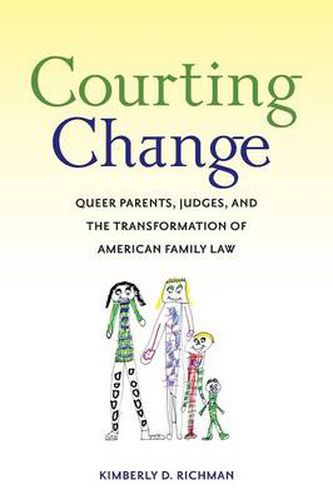Readings Newsletter
Become a Readings Member to make your shopping experience even easier.
Sign in or sign up for free!
You’re not far away from qualifying for FREE standard shipping within Australia
You’ve qualified for FREE standard shipping within Australia
The cart is loading…






Winner of the 2010 Pacific Sociological Association Distinguished Contribution to Scholarship Award
A lesbian couple rears a child together and, after the biological mother dies, the surviving partner loses custody to the child’s estranged biological father. Four days later, in a different court, judges rule on the side of the partner, because they feel the child relied on the woman as a psychological parent. What accounts for this inconsistency regarding gay and lesbian adoption and custody cases, and why has family law failed to address them in a comprehensive manner?
In Courting Change, Kimberly D. Richman zeros in on the nebulous realm of family law, one of the most indeterminate and discretionary areas of American law. She focuses on judicial decisions-both the outcomes and the rationales-and what they say about family, rights, sexual orientation, and who qualifies as a parent. Richman challenges prevailing notions that gay and lesbian parents and families are hurt by laws’ indeterminacy, arguing that, because family law is so loosely defined, it allows for the flexibility needed to respond to-and even facilitate - changes in how we conceive of family, parenting, and the role of sexual orientation in family law.
Drawing on every recorded judicial decision in gay and lesbian adoption and custody cases over the last fifty years, and on interviews with parents, lawyers, and judges, Richman demonstrates how parental and sexual identities are formed and interpreted in law, and how gay and lesbian parents can harness indeterminacy to transform family law.
$9.00 standard shipping within Australia
FREE standard shipping within Australia for orders over $100.00
Express & International shipping calculated at checkout
Winner of the 2010 Pacific Sociological Association Distinguished Contribution to Scholarship Award
A lesbian couple rears a child together and, after the biological mother dies, the surviving partner loses custody to the child’s estranged biological father. Four days later, in a different court, judges rule on the side of the partner, because they feel the child relied on the woman as a psychological parent. What accounts for this inconsistency regarding gay and lesbian adoption and custody cases, and why has family law failed to address them in a comprehensive manner?
In Courting Change, Kimberly D. Richman zeros in on the nebulous realm of family law, one of the most indeterminate and discretionary areas of American law. She focuses on judicial decisions-both the outcomes and the rationales-and what they say about family, rights, sexual orientation, and who qualifies as a parent. Richman challenges prevailing notions that gay and lesbian parents and families are hurt by laws’ indeterminacy, arguing that, because family law is so loosely defined, it allows for the flexibility needed to respond to-and even facilitate - changes in how we conceive of family, parenting, and the role of sexual orientation in family law.
Drawing on every recorded judicial decision in gay and lesbian adoption and custody cases over the last fifty years, and on interviews with parents, lawyers, and judges, Richman demonstrates how parental and sexual identities are formed and interpreted in law, and how gay and lesbian parents can harness indeterminacy to transform family law.